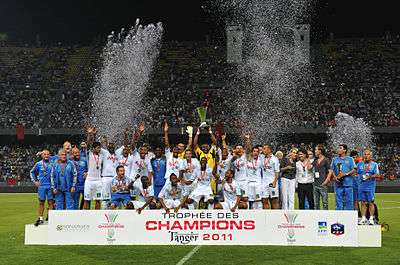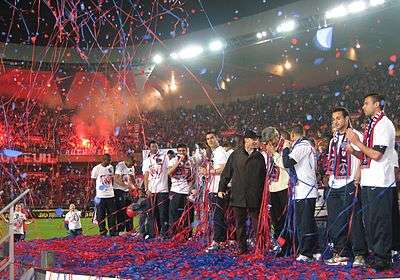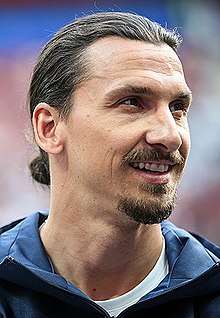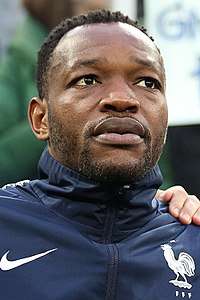Le Classique (French pronunciation: [lə klasik], The Classic),[1] also known as Le Classico,[2] Derby de France,[1] or French clásico,[3] is a football match contested between French clubs Paris Saint-Germain and Olympique de Marseille.[3] The clash is considered France's biggest rivalry,[1][3][4][5][6][7][8] and one of the greatest in club football.[3][6][9][10][11][12][13] At the very least, it is France's most violent. Important security measures are taken to prevent confrontations between the fans, but violent episodes still often occur when the duo meet.[1]
PSG and l'OM remain, along with Saint-Étienne, the only French clubs with a big history pre-millennium. The duo are the only two French clubs to have won major European trophies and were the dominant forces in the land prior to the emergence of Olympique Lyonnais at the start of the millennium. They are also the two most popular clubs in France, and the most followed French clubs outside the country. Both teams are at or near the top of the attendance lists every year as well.[1][3]
Like all the game's major rivalries, PSG vs. OM extends beyond the pitch. The fixture has a historical, cultural and social importance that makes it more than just a football match. It involves the two largest cities in France: Paris against Marseille, capital against province and north against south.[1][3]
History
The origins
The rivalry between Paris Saint-Germain and Olympique de Marseille did not begin until the late 1980s. Before then PSG, who were only founded in 1970, rarely had a team capable of matching Marseille, traditionally a giant of the French game. Formed in 1899, Marseille have been competing for trophies for most of their history and, for the first 87 years at least, were more concerned about games against Saint-Étienne or Bordeaux than trips to the capital. Nevertheless, the potential for a North vs South rivalry was always there and when PSG claimed their first championship under Gerard Houllier in 1986, it finally emerged.[14]
Shortly after PSG’s title success, two things happened that would shape the rivalry for years to come. First, Bernard Tapie, a socialist politician and adviser to the French president François Mitterrand, was elected president of Olympique de Marseille. Second, Canal +, the biggest pay television station in France, bought PSG.[14] The two sides began to flex their muscles in the transfer market. Marseille signed Chris Waddle, Jean-Pierre Papin, Rudi Völler, Basile Boli and Enzo Francescoli, while Paris responded with David Ginola, Youri Djorkaeff, George Weah and Raí.[1][3]
From 1989 to 1998 their list of honours was magnificent: between them they picked up five league titles, four French Cups, two French League Cups, a UEFA Champions League, a UEFA Cup Winners' Cup and reached two other European finals.[14] Marseille dominated the fixture for many years and did not lose to their northern rivals between 1990 and 1999, although they did spend two seasons in the second division during that time.[3]
Incidents
The Derby de France (as it's sometimes called) increased in importance and ferocity during the late 1980s as PSG and Marseille battled each other for the Ligue 1 title. The rivalry grew into the national spotlight as PSG owners Canal + and Marseille's Bernard Tapie promoted the matches between these clubs to a confrontational level.[1] The hype may have been a clever marketing tool, but it also heightened tensions between the two sets of supporters. Reports of fan violence became more frequent in the early-'90s as rivalry turned into downright hatred.[14]
The rivalry has been marred with injuries and arrests over the years. In 1995, fighting during the semifinal of the French Cup between PSG and Marseille resulted in 146 arrests and nine policemen hospitalized. In 2000, a Marseille fan was paralyzed for life after being struck by a seat thrown from the PSG section in Paris. Even fans of the same team have turned on each other as in 2010 a PSG supporter was put into a coma and eventually died after being attacked by members of another PSG supporters group.[1]
Despite the hostilities, many players have played for both clubs and have subsequently suffered abuses from the rival supporters. In the 2004 French Cup final, PSG captain Frédéric Déhu was constantly booed by Parisian fans after it had been revealed earlier in the week he would be joining deadly rivals l'OM when his contract expired at the end of the season. After lifting the trophy, Déhu disappeared into the dressing room in tears. Months later, Fabrice Fiorèse also left PSG for Marseille after a confrontation with then manager Vahid Halilhodžić. He went from being a fan favorite to being the most hated. Upon their return to the Parc des Princes, Déhu and Fiorèse were effectively whistled and chanted out of Le Classico by outraged Paris fans.[15]
Memorable matches
In their early meetings there was little indication the two would become deadly adversaries.[3] The first meeting between the pair occurred in December 1971 at the Stade Vélodrome, just a little over a year after PSG were formed.[6] It ended in a comprehensive 4–2 win for a Marseille side inspired by the strike duo of Roger Magnusson and Josip Skoblar.[3] In fact, it wasn't until 1975 before the Parisians managed their first victory in the fixture.[6] An equally unforgettable match was the 1989 title decider at the Stade Vélodrome with just three games left in the season. The championship looked to be heading to Paris with the score tied at 0–0 and only a few seconds remaining. A long-range strike by Franck Sauzée, however, gave Marseille the points and set them on the road to their first league crown since 1972.[3]
Three years later, then-PSG coach Artur Jorge announced his side would crush their arch-rivals. l'OM president Bernard Tapie had other ideas, though. Seizing the opportunity to motivate his players, Tapie cut out the offending newspaper article and stuck it up in the dressing room. Marseille would not disappoint him, walking away with the victory. Another memorable Marseille date is 29 May 1993, only three days after they had defeated Milan in the UEFA Champions League final. The newly crowned continental kings and league leaders welcomed closest challengers PSG in a match that would determine the title. Tired of their European celebrations, l'OM quickly fell behind, only to hit back with three goals. Among them was one of the finest goals ever scored in French clásico history: a team effort finished by a 18-yard header from Basile Boli.[3]
The men from the Parc des Princes have had big nights as well. In 1999, a struggling PSG side earned a 2–1 win over league contenders Marseille, their first over their rivals in many years. What made the victory even more special for the Parisians was the fact that Marseille would finish the season a point behind eventual champions Bordeaux. PSG fans have fond memories of 2003 as well, when their players defeated Marseille three times, including two wins at the Stade Vélodrome, one of them a memorable 3–0 triumph thanks to Ronaldinho's star performance. And when the two sides met in the 2006 Coupe de France Final, Paris SG won 2–1, with Vikash Dhorasoo scoring the goal of the night.[3]
The rivalry today
PSG and l’OM were less successful in the late 1990s and 2000s but the rivalry remained just as fierce.[14] Marseille were generally more frequent title contenders during the 2000s, but PSG still managed to turn things around against their arch-rivals, most notably with a spectacular run of eight consecutive wins between 2002 and 2004.[3] Nowadays, however, the two clubs are operating on totally different planes since the arrival of Oryx Qatar Sports Investments (QSi) as PSG owners in 2011.[14][3] Now with the money to compete with the best clubs in Europe, star players such as Edinson Cavani,[16] Kylian Mbappé,[17] Neymar,[18] Zlatan Ibrahimović and Thiago Silva have been part of PSG's all star-lineup that Ligue 1 had not seen since the early 1990s Marseille squads.[1]
In 2018, the capital side won its sixth consecutive French Super Cup. This latest trophy takes Paris Saint-Germain — France's most successful club — to 36 major titles overall (excluding the UEFA Intertoto Cup and Ligue 2 titles). Marseille, in turn, have struggled to keep up. l'OM have not won a trophy since 2012 and its League Cup victory. Since this Olympian win, PSG have won 20 titles: five league championships, four French Cups, five League Cups and six French Supercups.[19] However, Marseille's new owner Frank McCourt pledged in 2016 to spend 200 million euros over the next four years to make the team competitive again, and the recent arrivals of Dimitri Payet and Patrice Evra have boosted fans' hopes that their team will be able to compete with PSG.[7] Marseille's last win against PSG came in November 2011.[20]





